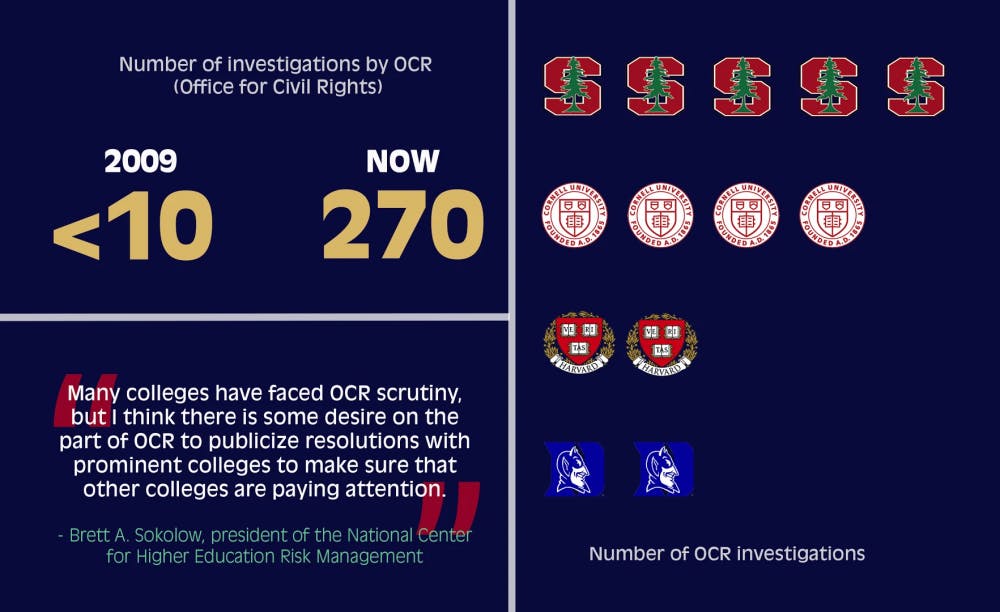Duke is currently facing a lawsuit and two federal investigations for potentially mishandling Title IX complaints from former students, but several other private institutions have recently encountered similar scrutiny for how they have addressed sexual assault and harassment reports.
Stanford University, Princeton University, Cornell University and Harvard University are among numerous private institutions that have faced at least three investigations by the Department of Education’s Office for Civil Rights. The OCR has also initiated a total of three investigations against Duke—one of which has been resolved and two of which remain open today.
After the OCR concluded the first investigation involving a complaint against Duke in 2013, the federal government launched another probe in November. The OCR—which does not publicize the reason for its reviews or the names of those involved before the cases are resolved—announced its latest investigation of Duke in August.
Investigations into higher education institutions are launched by the OCR when it receives complaints detailing alleged violations of Title IX—the federal law that prohibits sex discrimination in all educational programs that receive federal funding. According to the OCR webpage, the investigations involve interviews with the complainants, witnesses and other school administrators and usually last between two and four years.
The U.S. Department of Education’s Office for Civil Rights has opened a total of 321 investigations into colleges and universities across the nation since April 2011, with a steep increase in the number of cases opened in the past few years, according to The Chronicle of Higher Education.
Overall, the OCR is currently conducting 270 investigations at more than 190 different schools.
“We follow a careful process when a sexual misconduct allegation is made, one that ensures we are responsive, thorough and fair as federal law and our own policies require,” wrote Michael Schoenfeld, vice president for public affairs and government relations, in an email to The Chronicle when a Title IX lawsuit was brought against Duke last month.
Increased accountability
The OCR has not always reviewed how schools respond to reports of sexual assault as often as it does now. In 2009, the office received just nine complaints that were filed under Title IX.
Investigations by the OCR spiked in 2011 after the Department of Education issued a letter clarifying universities’ responsibilities for dealing with cases of sexual violence. The Department of Education also lowered the standard of evidence needed to decide if an accused student is guilty of misconduct.
Erin Buzuvis, law professor at Western New England University, noted that the clarification letter “raised important awareness about the availability of government enforcement to hold colleges and universities accountable.”
President Barack Obama’s launch of the “It’s On Us” initiative—which intends to increase attention to sexual violence prevention—in 2014 further underscored the federal government’s increased commitment to ending sexual assault on campuses.
Private vs. public
Ivy league and prestigious, private universities have especially faced numerous investigations by the OCR in the last five years. Stanford and Princeton are among the three institutions that lead the country with five Title IX investigations that have been or currently remain under review, according to the Chronicle for Higher Education.
Cornell is currently under review for four cases, while Columbia and the University of Chicago both have three on-going investigations. Harvard, like Duke, has faced three investigations since 2013-—two of which are ongoing.
Just eight public schools, by contrast, have been the subject of at least three Title IX investigations in the last three years.
Brett Sokolow—president and CEO of the National Center for Higher Education Risk Management, a consulting and law firm—explained that the OCR may investigate elite schools more often in order to generate more awareness among other schools.
“Many colleges have faced OCR scrutiny, but I think there is some desire on the part of OCR to publicize resolutions with prominent colleges to make sure that other colleges are paying attention,” Sokolow wrote in an email.
Wendy Murphy, adjunct professor of sexual violence law at the New England School of Law in Boston, noted, however, that private schools may try to cover up sexual assault cases to preserve their reputations. Murphy has previously brought complaints to the OCR against Harvard and Princeton.
“I’ve filed dozens more complaints over the years—against all types of schools—and the odd thing is, the lower tiered schools tend to be safer for women, in part because of the lack of entitlement in the potential offender population,” Murphy wrote in an email.
Resolving investigations
John Burness—visiting professor of the practice in the Sanford School of Public Policy and former senior vice president for public affairs and government relations —told The Chronicle in January that OCR investigations typically find that institutions have failed to appropriately respond to accusations of sexual violence.
At the conclusion of its investigations, the OCR and the institutions usually agree on resolutions which prescribe remedial actions and policies on how cases will be handled in the future.
The University of Virginia and Princeton, for example, have both changed their sexual misconduct policies after coming to agreements with the Department of Education.
Sokolow added that the OCR “typically implements deadlines by which the changes must be made and a three-year monitoring period to assure that those changes take effect.”
Get The Chronicle straight to your inbox
Signup for our weekly newsletter. Cancel at any time.

